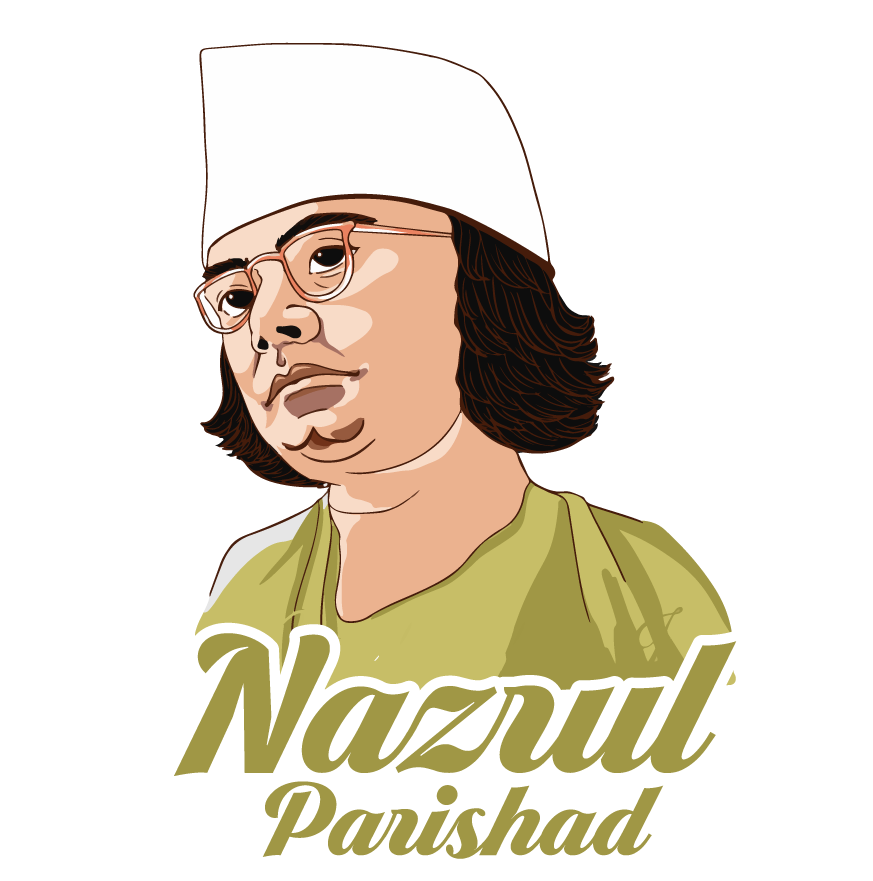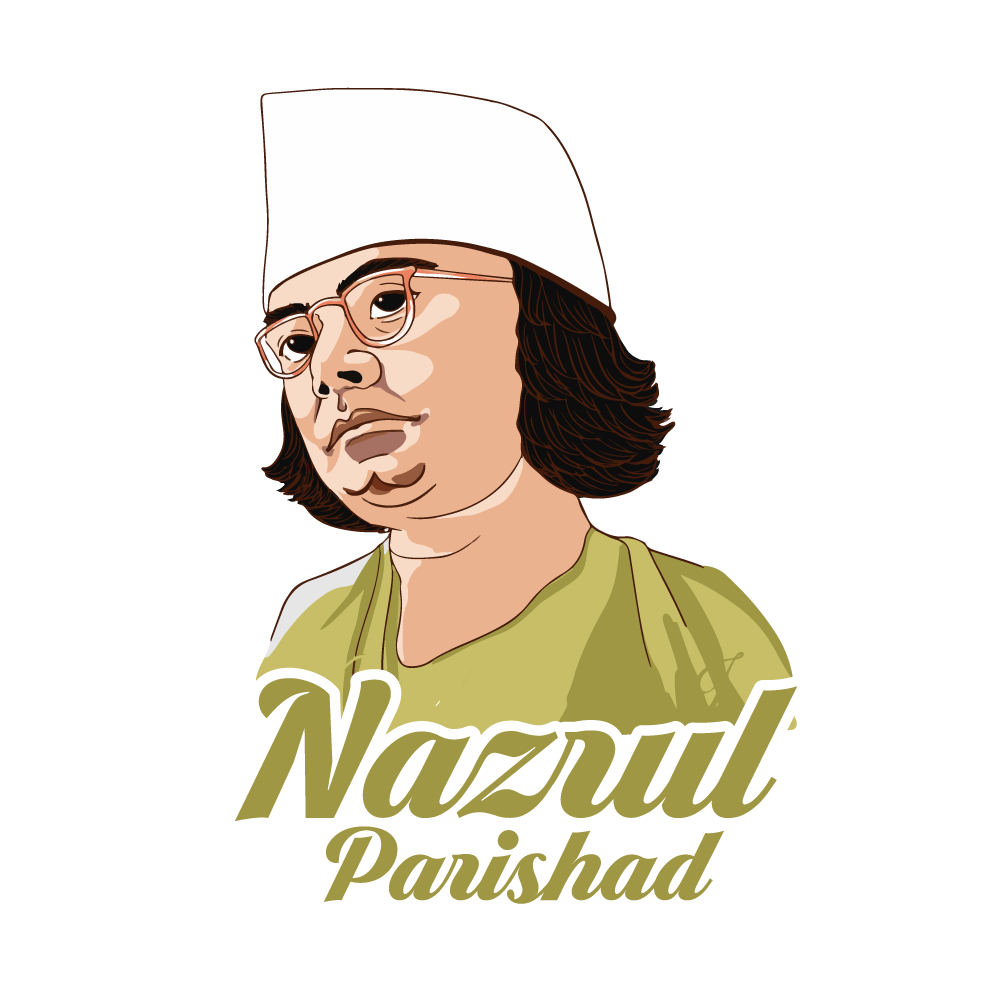Prominent poet, lyricist, and writer of Bengali literature, mainly his establishment and recognition as a rebel poet.
Birth
National Poet of Bangladesh rebel poet Kazi Nazrul Islam was born on May 24, 1899, in Churulia village of Burdwan district of West Bengal, India. Father’s name is Kazi Fakir Ahmed, mother’s name is Zaheda Khatun. Nazrul had three elder brothers, but they died shortly after birth. Nazrul’s grandmother named him Dukhu Mia as other sons died soon after birth. This Dukhu Miai was transformed into a great poet one day.
Childhood and family
Nazrul got little education in the village school. Along with the Bengali language, he learned Arabic and Persian at this time. Kazi Nazrul Islam’s childhood was spent with many hardships. His father was Khadem of a shrine and Imam of a mosque. Nazrul’s father died when he was ten years old. With three younger brothers and two sisters and a widowed mother all the burdens of the family fell on his shoulders. He had to struggle to fulfill this responsibility.
Education
As a child, Nazrul started studying in a madrasa. He could recite the Qur’an in a melodious voice. At this time, along with mischief, Nazrul started taking Persian language and literature lessons from his uncle. Kazi Nazrul Islam was always a restless person in his childhood. After his father’s death, he dropped out of madrasa and enrolled in primary school, and cleared the lower primary examination within just two years.
Slowly, Kazi Nazrul Islam became adept at composing rhymes and poems. During this time he did not study in school but acquired many books in the Bengali language and knowledge of Hindu and Muslim religious scriptures.
After that, he was admitted to a school in Raniganj. He fled to Asansol, a sub-district town in the Burdwan district while studying in class seven there. There he took a job making bread in a bread shop with a monthly salary of 5 rupees.
A constable there, Kazi Rafiquddin, seeing his penchant for singing and poetry, brought Nazrul to his native village in Mymensingh, Kazi Shimla. Here he has been admitted to a school. But he failed the exam and came back to Raniganj. Began to enrich his knowledge by reading various books of literature and poetry. Nazrul then got stuck, the test exam came before the matric exam.
Joining Leto’s party
At the age of eleven-twelve years, a villager quit school and joined Leto’s party. At that age, he wrote and composed some songs for this Leto group like Chashaar Song, Rajput, Meghnadvadh, etc. As he reached his teenage years, he became the leader of Leto’s team.
Joining the Army
World War I started when he was a 10th-standard student. On the call of patriotism, Nazrul joined Bengali platoon No. 49 in 1914 as a soldier. He had to go to Karachi with the army. Nazrul’s military life began, as well as his poet’s life. He translated some Rubai of Diwan-e-Hafez into Bengali in the cantonment of Karachi.
From there to Karachi. In the Karachi cantonment, he had a conversation with a fellow Punjabi cleric. His knowledge of the Persian language was profound. Nazrul took lessons from him about the works of Persian genius Hafiz, Sheikh Sadi, Rumi, Omar Khayyam, etc. From here, Nazrul felt the urge to write creative poems, stories, songs, ghazals, novels, etc.
Poetry
In March-April 1919, Nazrul came to Calcutta when the 49th Bengali Division was disbanded. New momentum was transmitted to Nazrul’s poetry. Nazrul’s fame as a poet spread with the publication of rebellious poetry. As a rebel poet, he was spontaneously hailed by the countrymen.
Imprisonment
Nazrul was sentenced to one year of rigorous imprisonment on 16 January 1923 AD after the publication of the article titled May Bhukha Hun in Dhumketu newspaper.
In October 1923, Nazrul’s famous book Agniveena was published. Shilpacharya Abanindranath Tagore painted the cover of this book.
Fasting
Rebel Nazrul started a hunger strike in Hooghly Jail to protest against the brutal treatment of jail authorities during his imprisonment. During this period selected biographers composed entire Bhangar songs, Sevak, and Maranavaran songs including the famous song ‘Aee Shikkal Para Chal’, and stoked the flames of life among the prisoners.
The news of Nazrul’s hunger strike spread public anger against the British government all over the country. From Shillong, the poet Rabindranath said, “Give up hunger strike, our literature claims you.” Jail authorities did not hand over that cable to Nazrul. The request of Deshbandhu Chittaranjan, poet Saratchandra, Abdullah Suravardi, and other patriots failed. After forty-nine days of hunger strike, under the pressure of public opinion and Rabindranath’s intervention, the British government promised to accept the demands of the prisoners. Nazrul broke his 40-day fast.
Marriage
On 25th April 1924 Nazrul married his lover Ashalata Sengupta. After marriage, she was named Pramila.
Poet’s first acquaintance with Gandhi
Bisher Banshi was published in the same year. The poet first met Mahatma Gandhi at the Congress Provincial Conference in Faridpur in 1925 AD. Gandhiji was impressed by listening to the ‘charka song’ in the poet’s voice.
Career
In 1928 AD Nazrul got a job at the British Gramophone Company. First, he became a singing trainer and later a composer. The number of songs composed by him is more than three thousand. His own style of music is known as Nazrul-giti.
Dementia
In 1939 AD Nazrul-Zaya Pramila became paralyzed due to paralysis. A few years later, in 1942 AD, the poet himself lost his senses due to paralysis and became silent.
Award
In 1945 AD Calcutta University honored Nazrul with the Jagattarini Padak award. 1960 AD Government of India awarded Padma Bhushan. The government of Bangladesh honored Nazrul with Ekushey Padak on Martyr’s Day 1975 AD.
Death
1976 AD On 29th June, the eternal rebel Nazrul breathed his last in Dhaka. He was buried there with state dignity.

